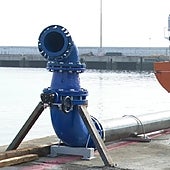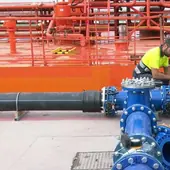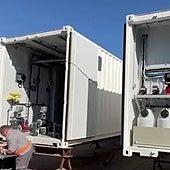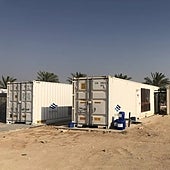Head of the Junta: 'If it doesn't rain between now and summer we will have serious supply problems in our provincial cities and major towns'
Juanma Moreno has spoken to SUR at length about the drought situation in the Andalucía region on his return to Spain, after attending the Climate Summit (COP28) in Dubai
Héctor Barbotta
Seville
Tuesday, 19 December 2023, 09:52
The president of the Junta de Andalucía regional government, Juanma Moreno, has returned to Spain after recently attending the Climate Summit (COP28) in the United Arab Emirates (UAE).
Drought was at the top of his concerns, and in this interview with SUR he discusses the current situation and some of the takeaways from Dubai that could prove to be a resolution to Andalucìa's ongoing drought crisis.
Why has Andalucía been to the Climate Summit in Dubai?
Climate change and its effects, such as the drought we are suffering, have already become the greatest challenge we must face in the coming years and decades, I would say. Andalucía is one of the most vulnerable territories and we are already seeing this in the water shortage situation we are suffering in a large part of the region. That is why it makes perfect sense for Andalucía to be present at the COP, where this year we have also demonstrated our leadership in environmental policies by being the only region represented at this summit.
Did you see it as an opportunity?
A global opportunity to re-emphasise the necessary recognition of Andalucía's unique climate; we have also demanded, together with the European Committee of the Regions, the role that regions and cities must play in the fight against climate change with greater technical and economic resources. But we have also taken the opportunity to reinforce Andalucía's leading role in the development of new energy sources, such as green hydrogen or the great commitment we are making to renewables. And the fact that COP28 has been held in Dubai has also allowed us to learn first-hand about the technology and engineering solutions that this city has implemented to become one of the cities with the most water resources in the middle of a desert, thanks to desalination and efficient consumption. These aspects are of great interest to us so that we can apply them in Andalucía and make up for the lack of rainfall.
On a global level, the summit ended with controversy
The balance is bittersweet. The sweet part is that for the first time in history the oil-producing countries themselves recognise that we have to move towards a transition to the end of fossil fuels. The negative part is that this agreement is not binding and does not commit to anything. Europe has once again taken the lead on this issue and dragged the United States along with it.
What will the situation be in 2024 if there is no rain?
There are fewer and fewer windows of opportunity left to receive those longed-for rains. It is true that the forecasts pointed to a wetter autumn than usual, but unfortunately these forecasts have not been fulfilled and the reservoirs are still at 20% of their capacity, 30 points below the average of the last decade. If there is no more rain this month, we still have the window of March and April to receive some rain. But if we don't have that wet spring, if it doesn't rain between now and the summer, we will have serious supply problems in our provincial cities and major towns, with the impact on the population but also on the economy in agriculture, industry and tourism.
Related news
The drought seems to be advancing faster than the solutions that can be implemented by the administrations
We have to assume that drought has already become a structural problem. Unfortunately, Andalucía is going to lack water and for this reason we must make every effort and use all the resources available to us. The Andalusian government is working on the fourth drought decree, we already have an SOS plan and a drought plus plan; with all of this we have activated more than a thousand actions in the area of water, which are going to involve an investment of more than 4,000 million euros between now and 2027.
What are the most urgent actions?
The most urgent ones have led us to consider, if necessary, having ships to supply the coastline of the Costa del Sol from the port of Malaga, or having portable desalination units, as well as the recovery and activation of strategic boreholes in disuse to provide short-term service to areas as affected such as the Axarquia. Meanwhile, we continue to work to make the Vélez Málaga desalination plant a reality as soon as possible and we are working on similar projects in Malaga and Marbella. We must make every effort possible, but Andalucía needs the Spanish government to understand the urgent need to start up facilities of this type, which take between three and five years. That is why I have proposed to the government, which is the competent administration, to propose as soon as possible a timetable of specific desalination actions for the entire coastline, from Huelva to Almeria.
Are there already irreversible consequences?
We are already seeing the direct consequences of climate change in Andalucía, from heat waves to the absence of rain. And this directly affects crops, industrial activity and, therefore, the daily lives of Andalusians. In addition to the dozens of municipalities that are already suffering restrictions or are on alert, the Andalusian economy will suffer in terms of GDP due to the drought. In this year's COP we have presented a tool, Mapa Clima, which allows you to check the climatic effects of the changes we are experiencing municipality by municipality. In this way, any citizen who accesses it will be able to check the evolution of the impact of the climate crisis in their town or city, and see the projection of these changes over the years. For example, a resident of Algarrobo, Ronda or Antequera can see how it has affected their town and how it will continue to do so in the future. I think it is very important that we can all be aware of the real and tangible consequences of what we are experiencing. The lack of water is no longer something temporary; the lack of rain is not something that comes and goes, but with climate change unfortunately it is something that we are going to be left with.
One of the things we have done in Dubai is to learn from countries that are drier than Andalucía and where solutions have been put in place to solve the structural lack of water with large infrastructures. It is a question of learning from the problems already suffered by other areas of the world, and the way in which they have solved them, such as Israel, Dubai or California. As in these cases, we want to think big and carry out large-scale infrastructures that will allow us to solve the problems we are facing, which is why I appeal to the need for a great water pact, and to create an alliance between administrations to implement these actions as soon as possible. Because we are already behind schedule. In fact, the Andalusian government is on this path and just this week we signed a water alliance with the Malaga Provincial Council to undertake strategic works to combat the current and future droughts.
La Axarquia is crying out for its own desalination plant, which is the responsibility of the government, but the process is progressing very slowly and the environmental procedures are still missing. To what extent will it be possible to speed up its approval and construction? Do you think that the long environmental procedures could be a burden for the economy of the main subtropical producing region?
When the Spanish government announced that it would assume responsibility for the construction of a desalination plant in Axarquia, Andalucía saw the need to sign a collaboration protocol to create a technical working group that will allow us to be vigilant that the more than 100 million euros that have been put on the table for Next Generation funds for this project are not lost. On the other hand, in Andalucía, the administrative process for the concession of desalinated water for the promotion of the private project continues independently, as it could not be otherwise. The two desalination projects that could be eligible for the concession have already been put out to public tender.
The desalination plant is a more long-term solution, but the problem is urgent.
Of course, the desalination plant is a permanent solution to the water problem in the Axarquia, but it is years away. In the meantime, if the situation in La Viñuela does not recover, we are implementing other emergency measures, such as the catchment at the lowest levels of the reservoir, a portable desalination plant or the 22 cubic hectometres that recycled water treatments are already providing. We have made the province of Malaga and La Axarquia the epicentre of our government's water investments, with more than 300 million mobilised infrastructures that are strategic, such as the interconnection, the La Rosaleda pumping station, already in service, or the Rojas pumping station currently under construction. All of them do not allow water to be taken from one area to another and, therefore, all the agreed measures will benefit the whole province of Malaga. It is vital that we highlight the expansion work that this government is carrying out on the Marbella desalination plant, as it will benefit the whole province with the interconnections put in place.
How long will it take for the portable desalination plants in Axarquia and Marbella to be up and running, and will we see these infrastructures along the entire Andalusian coast?
Portable desalination plants have the advantage that, being temporary facilities, they are designed to be located next to network connections to supply a limited number of users, but in a shorter period of time. They are prefabricated units that can desalinate the amount equivalent to the consumption of a municipality of approximately 50,000 inhabitants, but be operational in less than a year compared to the five years that a larger desalination plant would need. Even the largest permanent installations of this type have the limitation that they can only supply water up to 50 kilometres inland. They will be useful on a coastline such as the Costa del Sol, with a high demand from both the agricultural and tourist sectors. The idea is that in the long term we can tackle the construction and commissioning of stable and permanent desalination plants to banish dependence on water resources from reservoirs and supply drinking water from the sea along the almost 800 kilometres of the Andalusian coastline, as a definitive solution.
You have been calling for a great water pact for some time now, do you think it is possible in the current political climate, and could the pact signed in relation to Doñana be a good precedent?
It is a problem that does not only affect Andalucía... that is why I claim that everything related to water should be considered a state policy, which is nothing more and nothing less than removing it from partisan confrontation and making it a priority for the future of all regions. Some of us, such as Andalucía, are more vulnerable due to our geographical situation, but we are already seeing how other regions are also suffering from a lack of rainfall or unusual temperatures. In the background is the need to achieve a great alliance between the administrations that have competence in water issues and to achieve this great pact that allows, among other things, to prioritise the works and actions that are necessary to guarantee the supply to citizens, but also to industry, the countryside and tourism. Andalucía will always be part of this call for high-level politics; and I believe that the agreement reached for Doñana demonstrates that this has always been the position of the government over which I preside: the permanent search for solutions to problems through dialogue and agreement.
But do you think an agreement is possible?
There are two regions that are having a really bad time, namely Catalonia and Andalucía. I think that unfortunately the political climate of a lot of noise and confrontation, where general interests do not prevail, does not help. I see it as very difficult for one region to cooperate with another on water issues because it is not the priority of the Sánchez government at the moment and because I do not see a pro-independence community showing solidarity on water issues.
The Spanish government is the owner of the Guadalquivir Confederation, which is responsible for 67% of Andalucía's territory. The Junta has been complaining for some time that the pending works are not being carried out. Have you been able to talk about this with the vice-president Teresa Ribera when you met her in Doñana?
The Andalusian government and the Spanish government are condemned to understand each other because of this distribution of powers over the basins that affect Andalucía, because that is how it should be. I believe that we must put aside party politics or the politics of punishing the regions, because the administrations are there to provide solutions to problems and not generate them. The Regional Ministry has come to the aid of the Ministry and has taken on the execution of 76 hydraulic works that had been considered to be of general state interest, but which had not been undertaken... Thanks to the agreement for Doñana, with all the joint work that has been done in the negotiation between the technicians of the Regional government and those of the Ministry, at intermediate levels, and also thanks to the willingness of the Vice-President, a fluid line of dialogue has been opened with the ministry of ecological transition, which I hope and trust will result in greater receptiveness when it comes to tackling the necessary actions in Andalucía.
Do you think it is possible that the European Union will agree to recognise Andalucía's unique water resources or that the Spanish government will back this claim?
What is indisputable is that Andalucía is already suffering the consequences of this climate crisis. Just this week we have seen how Malaga has smashed the records for a month of December with a temperature of 29 degrees. And this is just one more example. It is a reality that does not go unnoticed by the EU authorities, because among other things we have made this known in the various bodies in which Andalucía is represented in Brussels, such as the Committee of the Regions. This region also feeds 500 million Europeans, so sensitivity to the effects we suffer is not an option, but a pressing necessity. On top of that, the recognition of territorial individuality already exists at European level, as the Canary Islands have due to their insularity and geographical location. So there are perfectly applicable precedents, in this case for climatic uniqueness. Basically, what this recognition consists of is that the destination of part of the European resources should have a direct application in terms of water, climate adaptation and protection against the effects of climate change in a specific territory, in this case Andalucía. I am convinced that this is a reasonable and reasoned demand due to the reality of an emergency that is already having its effects and will do so even more severely in the coming years. Anticipating and acting to alleviate them is what we are trying to do in Andalucía.




-Rwv9O22MxaWV7AbBqxEmsuM-1200x840@Diario%20Sur.jpg)